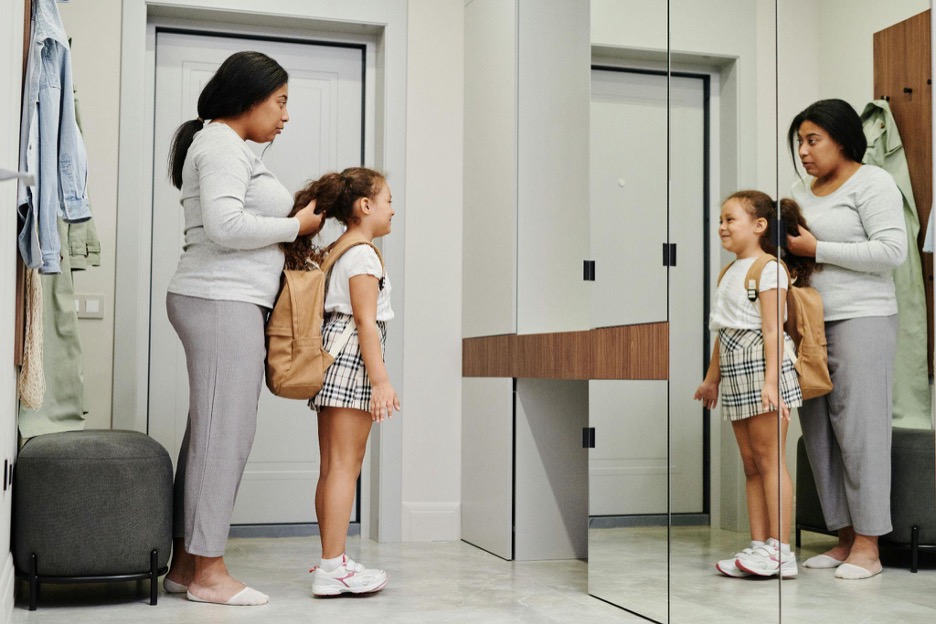Co-parenting after a divorce or separation can be challenging, but it’s essential for your child’s well-being. This article provides practical tips and strategies to help you and your co-parent work together effectively. We’ll cover key elements like communication, creating a co-parenting plan, managing special events, and supporting your child’s emotional health.
Key Takeaways
- Co-parenting requires collaboration focused on the child’s well-being, necessitating regular communication and mutual respect between parents.
- A detailed co-parenting plan outlines decision-making authority, child exchanges, and handling unexpected changes, prioritizing children’s needs.
- Effective communication and conflict resolution strategies, including seeking professional help when necessary, are essential for maintaining a positive co-parenting relationship.
Understanding Co-Parenting
Co-parenting involves working together to ensure that your child’s happiness, stability, and future well-being are prioritized. Active involvement from both parents post-divorce is vital for meeting children’s needs and helps maintain close relationships with both parents. Children thrive in co-parenting arrangements when both parents stay engaged in their lives, fostering security and consistency.
However, co-parenting is not a one-size-fits-all process; each family needs to find what works best for their scenario. Post-divorce dynamics often require adaptation and understanding from both parents. Effective co-parenting involves separating personal relationships from co-parenting roles and keeping the child’s best interests at the forefront.
Definition of Co-Parenting
Co-parenting is defined as decision-making together about the child’s well-being post-separation or divorce. This involves setting aside differences to work together in the child’s best interests. Successful co-parenting hinges on a conscious choice to collaborate for the children’s well-being. Co-parents should prioritize the child’s needs over their own emotions and commit to consistent and regular communication to strengthen their collaboration.
Effective co-parenting emphasizes sharing parenting responsibilities with a former partner. A spirit of cooperation and a cordial relationship between co-parents are vital for positive co-parenting. Co-parenting aims to foster cooperation and teamwork in raising children with their best interests in mind.
Here are some popular article recommendations you might love to explore:
- Effective Co-Parent Strategies for Harmonious Parenting
- Top Tips on Co-Parenting for a Healthy Family Dynamic
- Coping with Parents Divorcing: Essential Tips for Children
Benefits of Active Co-Parenting
Children benefit from co-parenting as it instills a sense of security and consistency in their lives. Consistency in meals, homework, and bedtimes helps co-parents manage children’s schedules effectively, crucial for emotional growth. Such consistency aids children in adjusting to two homes, minimizing confusion and divided loyalty.
Moreover, children observe their parents’ cooperation, which provides relief and shows them that their parents are a team working together. This cooperative relationship is beneficial for their overall well-being, as it reduces feelings of divided loyalty and emotional strain.
Giving your co-parent the benefit of the doubt and maintaining a positive environment for children is essential for successful co-parenting.
Challenges of Co-Parenting
Co-parenting comes with its own set of challenges. Differing parenting styles can exhaust and crank children, affecting their emotional well-being. To manage these differences, co-parents should accept personal preferences while focusing discussions on the child’s needs. Maintaining clear communication is essential for sharing information about the child’s well-being and co-parenting arrangements.
Recurrent arguments between parents can make life difficult for children, leading to negative emotional responses. It is advised to avoid engaging in historical arguments when addressing disagreements with a difficult co-parent. Compromising and agreeing to disagree aids in effectively navigating differences.
In some cases, unresolved feelings during co-parenting can create a negative emotional climate, hindering the focus on what matters most—the child. Parallel parenting, which minimizes direct interaction, can reduce conflicts when communication is challenging. Understanding these challenges and actively working to overcome them is crucial for successful co-parenting.
Creating a Co-Parenting Plan

A detailed co-parenting plan is fundamental for a successful relationship. At its core, the plan should always prioritize the children’s needs above all else. It’s important to establish clear guidelines on who will have legal decision-making authority regarding the child, how to manage child exchanges, and how to handle unexpected changes in schedules.
It should include provisions for holidays and special events to ensure both parents can participate without conflicts. Splitting holidays or alternating years allows both parents to be involved in their child’s celebrations while reducing feelings of exclusion. This structure helps in maintaining stability and creating joyful memories for the child.
Key Elements of a Co-Parenting Plan
A comprehensive co-parenting plan should detail key elements such as legal decision-making authority, which outlines who will make important decisions regarding the child’s education, health, and welfare. It should also specify how child exchanges will be managed, including potential locations and transportation methods to ensure smooth transitions between homes.
Provisions for handling unexpected schedule changes are essential, as flexibility is crucial. Clear boundaries for new partners in parenting decisions help avoid confusion and conflicts.
Clear boundaries between co-parents and new partners are essential to prevent misunderstandings and maintain a positive co-parenting environment.
Flexibility and Adaptation
Adaptability and flexibility are key elements of a successful plan. Structure is important, but acknowledging unforeseen circumstances that require adjustments is equally crucial. A mix of structure and flexibility helps manage commitments and maintain a cooperative co-parenting relationship.
Holiday schedules, for example, may need adjustments due to unforeseen events. By maintaining flexibility in holiday plans, co-parents can foster cooperation and minimize tension, ensuring that the child’s happiness remains the priority.
Being adaptable and open to change is essential for a harmonious co-parenting arrangement.
Legal Considerations
Legal aspects significantly influence the creation of a co-parenting plan. Legal consultation can guide co-parents through custody arrangements and dispute resolutions, ensuring the child’s best interests. If your co-parent refuses to engage in co-parenting or if conflicts arise, mediation is a recommended method for resolving disputes.
Documentation of interactions and commitments can be critical when dealing with challenging co-parenting situations. Using a co-parenting app can help manage communication when emotions run high, providing a structured and less emotional means of communication.
Seeking professional support when needed can ensure that the co-parenting arrangement remains effective and focused on the child’s well-being.
Effective Communication Strategies
Strong communication forms the foundation of a healthy co-parenting relationship. Focusing conversations on the children is crucial for effective co-parenting communication. Good communication involves collaboration and compromise, ensuring both parents work together for the child’s best interests.
Clear communication and planning ahead address the complexities of managing holidays and special events. Co-parents should refrain from making unilateral decisions regarding their children’s upbringing and instead work together to make informed decisions.
By fostering a spirit of cooperation and mutual respect, co-parents can navigate the challenges of co-parenting more effectively.
Communication Methods
Different communication methods facilitate effective co-parenting. Acceptable communication methods include phone calls, text messages, and emails, allowing co-parents to communicate effectively and stay informed about their child’s well-being. Scheduling meetings and organizing discussions about co-parenting responsibilities can help maintain a structured approach.
The tone of communication should be business-like, respectful, and neutral to avoid unnecessary conflicts. When emotions run high, it is advisable to use less emotional means of communication, such as a co-parenting app, to ensure clear and consistent communication. Requests regarding parenting should be framed as requests and not demands to foster cooperation.
Conflict Resolution Techniques
Conflict is inevitable in any co-parenting relationship, but it can be managed effectively with the right techniques. Here are some recommendations for resolving disputes:
- Engage a mediator, who provides a neutral party to facilitate discussions and agreements.
- Consider mediation or counseling when parents struggle to agree on parenting plans, as it can offer essential support.
- Focus on the child’s best interests during discussions to help both parties reach a consensus.
By utilizing these techniques, co-parents can navigate conflicts more effectively.
Compromise is essential in resolving conflicts about holiday plans and other significant decisions. By maintaining a focus on the children’s best interests, co-parents can de-escalate disagreements and find mutually acceptable solutions. This approach ensures that the child’s emotional well-being remains a priority, fostering a more harmonious co-parenting relationship.
Setting Boundaries
Clear boundaries are essential for maintaining respect and minimizing conflicts. Establishing emotional boundaries helps maintain mental health and ensures that personal issues do not interfere with co-parenting responsibilities. Clear communication boundaries during holiday planning and other significant events help to minimize conflicts and ensure a smooth co-parenting experience.
Involving a professional, such as a family therapist or parenting coordinator, can support co-parents in prioritizing their children’s needs amidst personal challenges. Establishing boundaries and expectations helps manage blended family dynamics effectively, ensuring that the interests of the child and the co-parenting relationship are respected.
Managing Special Events and Holidays
Special events and holidays can be a challenging time for co-parents, but with the right strategies, they can become opportunities for creating joyful memories. The key to successful holiday co-parenting is prioritizing children’s happiness and ensuring that they feel supported and loved during these times. Planning ahead and sharing celebrations are essential components of managing special events effectively.
Advance planning for special events helps prevent last-minute conflicts and ensures that both parents can participate actively in their child’s life. By cooperating on celebration plans, both parents can foster a positive environment for their children, reducing feelings of being torn between them.
Handling disagreements with a focus on the child’s best interests and using creative ways to share celebrations can help navigate conflicts more effectively.
Planning Ahead
Starting holiday planning early can help prevent last-minute conflicts and reduce stress. Advance discussions about holiday plans can help establish clear visitation times and alleviate misunderstandings, ensuring that both parents can participate actively in their child’s life without conflicts.
Establishing a consistent schedule for special events helps create a sense of stability and predictability for children. By communicating effectively and making decisions together, co-parents can present a united front and ensure that their children feel supported and valued during special occasions.
Sharing Celebrations
Common strategies for managing special celebrations in co-parenting include flexibility, splitting days, alternating years, and celebrating before or after special days. Implementing these strategies ensures that children can enjoy meaningful time with both parents, reducing feelings of being torn between them.
Sharing celebrations in a co-parenting arrangement is crucial for helping children feel supported and loved during special occasions. By cooperating on celebration plans, both parents can foster a positive environment for their children during special events.
Handling Disagreements
Advance planning for special events, such as holidays, can help avoid conflicts and ensure both parents can participate in their child’s life. Keeping the child’s happiness as a priority during holiday planning fosters a more positive co-parenting dynamic.
Using conflict resolution techniques, such as focusing on the child’s best interests and compromising, can help co-parents navigate disagreements more effectively. Creative ways to share celebrations between co-parents can ensure that the child enjoys time with both parents without feeling torn.
Supporting Your Child’s Emotional Well-Being
Supporting your child’s emotional well-being is a crucial aspect of successful co-parenting. Children need to feel loved and supported during the divorce process, and co-parents can show this through both words and actions. It’s important to reassure children that life will eventually feel normal again and to encourage them to express their feelings.
Keeping consistent routines and encouraging open dialogue are essential components of supporting your child’s emotional well-being. Maintaining a structured routine helps alleviate children’s anxiety and provides predictability and security. Encouraging open dialogue ensures that children feel understood and supported during the transition.
Keeping Consistent Routines
Maintaining a consistent schedule provides predictability and security for children. Establishing a structured routine is vital as it helps alleviate children’s anxiety and prevents behavioral issues. When a child returns to one parent’s home, it is recommended to keep things low-key and plan for quiet activities to help them adjust.
Parents can facilitate adjustment during the transition between homes for separated parents by allowing the child some space if needed. If signs of prolonged distress or behavioral changes emerge following divorce, children may benefit from professional assistance.
Prioritizing children’s emotional well-being by considering how they will experience holiday arrangements is essential for improving children’s lives.
Encouraging Open Dialogue
It is essential not to shut down communication with a co-parent as it hurts the children. When communicating with your ex, focus on the child’s well-being and conduct yourself with dignity. This approach helps create a positive environment for the child and reduces feelings of divided loyalty and emotional strain.
Children’s comprehension of divorce develops over time, necessitating ongoing conversations to address their evolving thoughts and feelings. Encouraging children to express their feelings can help them feel understood and supported during the transition. Open dialogue fosters mutual respect and helps co-parents communicate effectively.
Seeking Professional Help
When faced with questions or situations that cannot be solved independently, co-parents may consider seeking professional help. Family therapists can help co-parents focus on children’s needs despite marital issues, providing guidance and support to navigate the challenges of co-parenting.
Seeking professional help can improve communication and ensure that the co-parenting arrangement remains effective and focused on the child’s well-being.
Navigating New Relationships
Navigating new relationships in a co-parenting context must be handled with care to prevent negative impacts on the children involved. Introducing new partners and blending families can be challenging, but with the right approach, it can be a positive experience for everyone.
New partners should be introduced gradually, considering the child’s comfort and emotional readiness. Successful blended families often limit the number of significant changes at once to help children adjust. Positive interactions between children and new partners can build trust and respect, fostering better family relationships.
Introducing New Partners
A new partner can play a significant role in the child’s life, but timing is crucial. Introducing a partner too soon can create confusion and anxiety for children, so it’s important to approach this step with care. New partners should be introduced to children gradually to ensure comfort and openness.
Co-parents should find a positive way to approach the new mix, ensuring that the child’s well-being remains a priority. Clear communication about the timing and approach for introducing new partners is important for smoother co-parenting.
Blended Family Dynamics
When introducing new partners, it is crucial to allow children to adjust gradually to the change. Successful blended families often limit the number of significant changes at once to help children adjust. Positive interactions between children and new partners can build trust and respect, fostering better family relationships.
Focusing on positive parenting and maintaining healthy relationships within the blended family is essential for creating a supportive environment for everyone involved. By considering the child’s best interests and ensuring that they feel included and valued, blended families can thrive and create lasting bonds.
Respecting Boundaries
Preserving privacy and autonomy in each household prevents conflicts when new partners are involved. Boundaries in co-parenting situations ensure respect for the child’s interests and the co-parenting relationship. Clear boundaries help minimize misunderstandings and potential conflicts, allowing both co-parents to adapt better to their new relationships.
By respecting boundaries and maintaining mutual respect, co-parents can create a positive co-parenting environment that supports the child’s well-being and fosters healthy relationships. This approach helps ensure that the child’s needs remain the priority and that the co-parenting arrangement is effective.
Common Mistakes to Avoid
Co-parents should be mindful of common mistakes that can hinder effective co-parenting. Speaking negatively about the other parent in front of children is tremendously damaging and can impact their emotional well-being. Using children as messengers to communicate between parents puts them in a difficult position and creates unnecessary stress and tension in their lives.
Separating adult issues from children’s lives is vital for their mental health and well-being. Discussing adult problems with children can burden them and hinder their emotional development. By avoiding these common mistakes, co-parents can create a more positive and supportive environment for their children.
Negative Talk About the Other Parent
Speaking negatively about a co-parent in front of children is tremendously damaging and puts pressure on them. Treating your co-parent with respect acts as a protective factor for children, mitigating childhood trauma and creating a positive impression in potential court settings. Parents should avoid telling their children negative things about their ex to safeguard their emotional well-being.
Maintaining a respectful attitude towards your co-parent helps create a positive environment for the child and reduces feelings of divided loyalty and emotional strain. By focusing on positive parenting and refraining from negative talk, co-parents can support their child’s emotional well-being and foster a more harmonious co-parenting relationship.
Using Children as Messengers
Using children as messengers in co-parenting can create unnecessary stress and tension in their lives. The use of children to relay messages can have a negative impact on the child’s emotional and mental health. Parents should avoid using children as messengers to prevent putting them in the middle of parental conflict.
Direct communication between co-parents is essential to ensure the child’s well-being and mitigate misunderstandings. By communicating directly and effectively, co-parents can reduce stress and create a more positive environment for their children. This approach helps support the child’s emotional well-being and fosters a more harmonious co-parenting relationship.
Overloading Children with Adult Issues
Discussing adult problems with children can burden them and hinder their emotional development. Disclosing adult concerns to children can lead to feelings of helplessness and anxiety, negatively impacting their mental health. It is essential to keep adult issues separate from children’s lives to support their mental health and overall well-being.
Implementing communication boundaries and focusing on child-centered discussions can help in shielding children from adult issues. By maintaining a clear separation between adult problems and children’s lives, co-parents can create a more positive and supportive environment for their children.
Summary
Co-parenting post-divorce is undoubtedly challenging, but with the right strategies and mindset, it is possible to create a positive and supportive environment for your children. By understanding the importance of both parents’ involvement, creating a comprehensive co-parenting plan, and maintaining effective communication, co-parents can navigate the complexities of post-divorce life with confidence and grace.
Supporting your child’s emotional well-being, managing special events and holidays, and respecting boundaries in new relationships are all crucial aspects of successful co-parenting. By avoiding common mistakes and focusing on the child’s best interests, co-parents can foster a harmonious and cooperative co-parenting relationship. Remember, the journey of co-parenting is an ongoing process, but with dedication and effort, you can ensure that your children thrive and feel loved and supported every step of the way.
Frequently Asked Questions
What is the key to successful co-parenting?
Successful co-parenting hinges on the deliberate choice to work together for the children’s benefit, prioritizing their needs and fostering consistent, open communication between both parties.
How can I create an effective co-parenting plan?
To create an effective co-parenting plan, clearly outline legal decision-making authority, child exchanges, responses to unexpected changes, and boundaries for new partners. Consulting a legal professional while remaining flexible will enhance the plan’s success.
What are some common mistakes to avoid in co-parenting?
To ensure a healthy co-parenting relationship, avoid speaking negatively about the other parent in front of your children, using them as messengers, and burdening them with adult issues, as these can harm their emotional well-being. Prioritizing a positive environment is crucial for your children’s development.
How can I support my child’s emotional well-being during the divorce process?
To support your child’s emotional well-being during the divorce process, maintain a consistent routine, encourage open dialogue, and reassure them that the situation is not their fault. Providing a stable and supportive environment is crucial, and consider seeking professional help if needed.
How should I introduce a new partner to my children?
Introduce your new partner to your children gradually, ensuring their comfort and emotional readiness. Open and clear communication about the introduction will help make the transition smoother for everyone involved.









